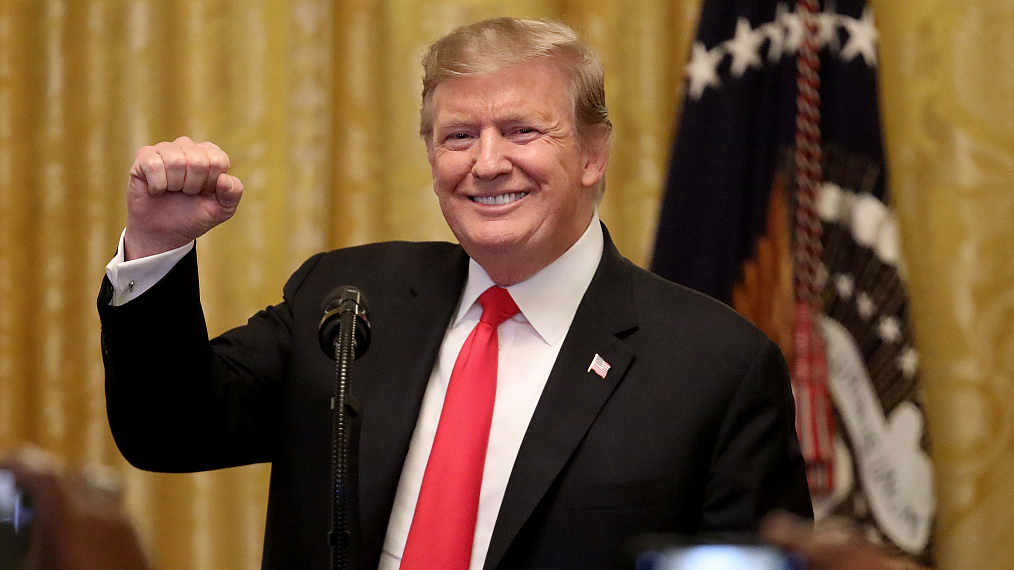

Editor's note: Chris Hawke is a graduate of the Columbia Graduate School of Journalism and a journalist who has reported for over two decades from Beijing, New York, the United Nations, Tokyo, Bangkok, Islamabad and Kabul for AP, UPI, and CBS. The article reflects the author's opinions, and not necessarily the views of CGTN.
Recent days have seen a series of racist attacks by U.S. President Donald Trump. People might be wondering how he can remain popular afterwards?
These attacks follow a history of derogatory remarks on war heroes, the judiciary, women, U.S. allies, the entire city of Baltimore, the intelligence community, journalists, the Federal Bureau of Investigation (FBI), and the Pope, among others. Political theorist Hannah Arendt offers some answers to this question in her book The Origins of Totalitarianism, published in 1951.
In some aspects, the conditions in the modern day U.S. mirror those of Europe in the 1920s and 1930s. Many people in the United States have come to the conclusion that no matter who they vote for, the government will not represent them or their interests.
This helped propel the inexperienced and relative outsider Barack Obama to the presidency with his message of hope. After Obama failed to deliver significant change, true political outsider Donald Trump was elected with his contagious message of anger and resentment.

The 8th anniversary marking the end of the World War I, Whitehall, London, UK, November 11, 1928. /VCG Photo
According to Arendt, fascist parties rose in Europe ahead of World War II under similar conditions. The public, and especially people uninterested in politics who did not normally take part in the public sphere, slowly became disillusioned with the system. They saw the rule of law and systems of government as rigged. For this reason, they were attracted to strongmen who promised to wield raw power to defend their interests.
Arendt wrote: "Since the bourgeoisie claimed to be the guardian of Western traditions and confounded all moral issue by parading publicly virtues which it not only did not possess in private and business life, but actually held in contempt, it seemed revolutionary to admit cruelty, disregard of human values, and general amorality, because this at least destroyed the duplicity upon which the existing society seemed to rest."
This describes the glee Trump supporters feel when the president "sticks up" for them or says what they dare not say.
This explains why Trump can brand Mexican immigrants as "rapists," say there were good people "on both sides" at a deadly neo-Nazi demonstration, separate parents from children at the border and leave them in conditions the UN describes as shocking, and freely attack lawmakers of color.
Arendt also speaks to why many voters, including evangelical Christians, aren't bothered by Trump's serial divorces, affairs with porn stars, womanizing together with a pedophile, bankruptcies and history of stiffing contractors.
"Failure in professional and social life, perversion and disaster in private life… The fact that their lives prior to their political careers had been failures, naively held against them by the more respectable leaders of the old parties, was the strongest factor in their mass appeal."
Republican lawmakers came forward after Trump's recent racist attacks on four freshmen congresswomen to say, "Trump is not a racist."
This defense resonated with many white people who hold what they consider to be fair views on people of color based on their real-world observations (or picked up from the media or peers), only to be branded "deplorables" by coastal elites and racist by other people in their own communities.
After all, the most segregated cities in the U.S. are in the North, and it is a rarity to find an elite white family in a Northern city that would put their children in a normal "urban" school. Almost all Trump supporters consider themselves to not be racist, and consider efforts to cast them in this light as bullying.
Trump supporters were delighted when he made the claim, "Islam hates us." After all, this is the conclusion a person might draw based on U.S. television coverage.
Trump supporters people saw factories close down, and increasing numbers of Chinese goods on Wal-mart shelves, and were happy when Trump promised to take on Beijing and bring back their manufacturing jobs.

Chinese made jackets are displayed for sale at a Manhattan department store, New York City, U.S., May 07, 2019. /VCG Photo
Trump voters like that he says "truths" that polite society avoids. Every time Trump tweaks coastal elites, his base loves him more. They feel Trump is their advocate. When Trump ignores his own senior officials, undermines his own intelligence agencies, or denigrates people different from them, he is in the view of his supporters pushing through "deep state" barriers that have kept them down.
Arendt, speaking of the followers of the European fascists, said, "To them, violence, power, cruelty were the supreme capacities of men who had definitely lost their place in the universe…. They were satisfied with blind partisanship in anything respectable society had banned, regardless of the theory or content, and they elevated cruelty to a major virtue because it contradicted society's humanitarian and liberal hypocrisy."
In addition, Arendt explained that under fascist leadership, "The difference between truth and falsehood may cease to be objective and become a mere matter of power and cleverness, of pressure and infinite repetition."
Trump has a weak grasp of policy, but a profound understanding of mass psychology. The specifics about whether making children sleep on concrete floors, pulling out of the Iran nuclear deal or raising tariffs on Chinese goods will actually help solve the immigration crisis, make the world a safer place or restore manufacturing jobs to the U.S. don't matter.
Trump, a former reality television star, is making a spectacle out of wielding power on behalf of his base, and this is what these voters will remember.
Resentment, anger, and loss of privilege are powerful forces. They are not usually susceptible to the use of reason, or appeals to common ground, mutual interest or our better angels.
Alarmingly, Trump is not the only leader on the world stage following this pattern. The rise of populist leaders around the world shows that voters are feeling left out by globalization and the widening gap between the haves and have-nots, displaced by automation, and unrepresented by their elected governments. The center is not holding. The question is: What lies ahead?
(If you want to contribute and have specific expertise, please contact us at opinions@cgtn.com)

Copyright © 2018 CGTN. Beijing ICP prepared NO.16065310-3
Copyright © 2018 CGTN. Beijing ICP prepared NO.16065310-3